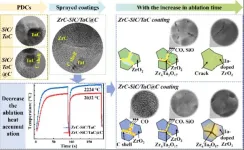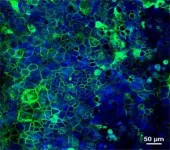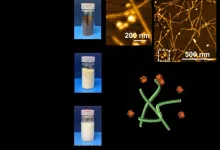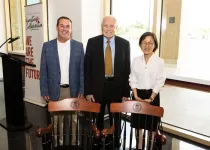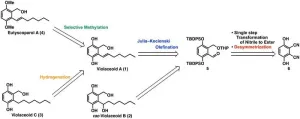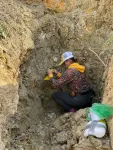(Press-News.org)
ZrC has drawn wide attention as an anti-ablation coating material for lightweight C/C composites but is limited by the produced porous and loose ZrO2 film. To address this issue, the second phase is introduced to improve the densification of the formed Zr-X-O film. Such as ZrC-SiC/TaC coating, the produced low-melting-point oxides, SiO2 (Tm=1650 °C), Ta2O5 (Tm=1800 °C) and Zr6Ta2O17 (Tm=1900 °C), helped to form a dense oxides film. However, the high service temperature causes heat accumulation and a large thermal stress gradient on the surface of the coatings, which will result in large local defects and accelerate the failure of the coating. To decrease the ablation heat accumulation, incorporating nanomaterials with high thermal conductivity is an effective strategy but is limited in practical applications due to the agglomeration. A core–shell structure is advantageous because it can endow the outer carbon shell with good dispersion and a thermal conduction network. However, achieving a uniformly dispersed core–shell structure within a dense coating remains challenging due to structural retention difficulty that is limited by complex preparation processes.
Recently, a team from Northwestern Polytechnical University, China, constructed polymer-derived SiC/TaC with a graphene shell, and prepared corresponding dense ZrC-SiC/TaC@C coating. This work not only explains the heat dissipation effect of carbon shell in ZrC–SiC/TaC coating on improving protective ability against ultrahigh temperature ablation, but also provides a constructive idea that the ablation resistance improvement can be improved by incorporating carbon nanomaterials.
The team published their work in Journal of Advanced Ceramics on July 30, 2024.
“In this report, we designed and constructed a thermally conductive nanonetwork with a ceramic@carbon core–shell structure. Polymer-derived SiC/TaC with a graphene carbon shell was synthesized and introduced into a ZrC coating by supersonic atmospheric plasma spraying. Incorporating carbon nanomaterials with high thermal conductivity could reduce the surface temperature of ablation coatings and then decrease the ablation heat accumulation. The surface temperatures of the ZrC–SiC/TaC@C and ZrC–SiC/TaC coatings reach 2032 and 2224 °C, respectively, corresponding to a temperature difference of nearly 200 °C. Compared with that of the ZrC–SiC/TaC coating, the Rl of the ZrC–SiC/TaC@C coating is lower, at only 0.009 μm/s, a decrease of 93.7%.” said Jia Sun, from School of Materials at Northwestern Polytechnical University (China), a senior expert whose research interests focus on the field of high-temperature ceramics material.
Other contributors include Yuyu Zhang, Xuemeng Zhang, Hongkang Ou, Qiangang Fu from the School of Materials at Northwestern Polytechnical University in Xi’an, China; Bozhe Wang from the System Design Institute of Hubei Aerospace Technology Academy in Wuhan, China.
This work was supported by the National Key R&D Program of China (Nos. 2022YFB3708600 and 2021YFA0715802), the National Natural Science Foundation of China (No. 52101098), the Aeronautical Science Foundation of China (No. 2022Z055053004), the Fund of Key Laboratory of National Defense Science and Technology (No. WDZC20235250505), the National Science and Technology Major Project (No. J2022-VI-0011-0042), the National Basic Scientific Research (No. JCKY2021607B035), and the Innovation Foundation for Doctor Dissertation of Northwestern Polytechnical University (No. CX2024006).
About Journal of Advanced Ceramics
Journal of Advanced Ceramics (JAC) is an international academic journal that presents the state-of-the-art results of theoretical and experimental studies on the processing, structure, and properties of advanced ceramics and ceramic-based composites. JAC is Fully Open Access, monthly published by Tsinghua University Press, and exclusively available via SciOpen. JAC’s 2023 IF is 18.6, ranking in Top 1 (1/31, Q1) among all journals in “Materials Science, Ceramics” category, and its 2023 CiteScore is 21.0 (top 5%) in Scopus database. ResearchGate homepage: https://www.researchgate.net/journal/Journal-of-Advanced-Ceramics-2227-8508
About SciOpen
SciOpen is an open access resource of scientific and technical content published by Tsinghua University Press and its publishing partners. SciOpen provides end-to-end services across manuscript submission, peer review, content hosting, analytics, identity management, and expert advice to ensure each journal’s development. By digitalizing the publishing process, SciOpen widens the reach, deepens the impact, and accelerates the exchange of ideas.
END
Fukuoka, Japan—The SDGs Design International Awards 2024 are calling for students worldwide to submit their original ideas for using design to achieve Sustainable Development Goals.
First organized in 2019 and led by Faculty of Design, Kyushu University, the awards aim to demonstrate the power of design in solving social problems and to elevate society's expectations for design.
Now in its sixth year, this year’s theme is “Let’s Create Sustainable Design for FOOD." ...
Along with all the coffee we drink every day, over 6 million tons of spent coffee grounds are produced annually worldwide. Some of these grounds are reused as biofuel but the rest are disposed of in landfills. Over the last decade, research has focused on how to reuse these grounds. The primary focus has been on the polysaccharides from the cellulose and hemicellulose in the ground up coffee bean’s cell walls. Polysaccharides are used in composites, biopolymers, food packaging, construction materials and cellulose nanofibers (CNFs). CNFs specifically, which are cellulose reduced to nanoparticle size, 3 to 5 ...
As the effects of a changing climate and other ecological insults compound, many coral reefs face severe perturbations and a generally poor prognosis for recovery. In an article published in BioScience's new "Perspective and Insight" category, Dr. Peter J. Edmunds of California State University, Northridge, argues for the continued monitoring of coral reefs, even when the seascapes they inhabit are in a significantly degraded state.
Drawing from his ongoing 37-year study in the US Virgin Islands, Edmunds argues that "only consistent, rigorous, and detail-oriented ...
Rockville, MD (8/9/2024) – The AIM-HI Accelerator Fund today announces Margaret Foti, PhD, MD (hc), Chief Executive Officer of the American Association for Cancer Research (AACR), is selected unanimously by the 2024 Blue Ribbon Selection Committee as the recipient of the 2024 Beacon Award for Women Leaders in Oncology, from a pool of outstanding global nominees.
The Beacon Award for Women Leaders in Oncology was established in 2022 by the AIM-HI Accelerator Fund and sponsored by the National Foundation for Cancer Research (NFCR). The Beacon Award recognizes outstanding women leaders in health and life sciences who have significantly impacted cancer ...
In a July 9 ceremony, Thomas Abbruscato, Ph.D., and Min Kang, Pharm.D., became the first recipients of the Douglas Stocco Research Chair, an endowment formerly known as the Texas Tech University Health Sciences Center’s (TTUHSC) Research Endowment. The Texas Tech University System Board of Regents officially renamed the endowed chair in late November 2023 and made two appointments available.
Abbruscato, professor and chair in the Department of Pharmaceutical Sciences at the TTUHSC Jerry H. Hodge School of Pharmacy, said it is an honor to receive the endowment.
“Personally, I am humbled to have ...
The natural world is rich in chemical compounds with remarkable medicinal properties. A notable example is penicillin, discovered by chance from the Penicillium mold. This discovery revolutionized the treatment of bacterial infections and highlighted the potential of natural compounds in medicine. Since then, the identification, isolation, and synthesis of novel bioactive compounds from plants, fungi, and bacteria have become fundamental to drug development.
Recently, two groups of naturally occurring bioactive compounds have garnered significant attention: violaceoids A–F ...
New research from the University of Adelaide has shown that glossy black-cockatoos prefer to feed from trees growing in acidic soils.
Glossy black-cockatoos are seed-eating birds that feed almost exclusively on the cones of drooping sheoak trees. However, counterintuitively, they select trees that grow on the poorest soils found on ancient sedimentary rocks.
“Sheoak trees are three times more likely to be used as feeding trees if they are growing on non-limestone sedimentary rocks,” says Dr Gay Crowley, from the University of Adelaide’s School of Social Sciences.
Dr Crowley compared 6,543 feeding records with 23,484 ...
Autistic youth who were born in underserved neighborhoods are more likely to have greater attention deficit hyperactivity disorder (ADHD) symptoms than those born in communities with more resources. This is one finding of a new study led by researchers at the UC Davis MIND Institute.
This is the first time researchers have investigated how neighborhood factors are associated with ADHD in autistic and non-autistic children. The study provides new insights into mental health conditions and has the potential to inform public policy changes to improve health equity.
It was published in the journal JCPP Advances.
“We found that some neighborhood ...
Content warning: This post contains details of sharing intimate imagery without consent that may be disturbing to some readers.
While much attention on sexually explicit “deepfakes” has focused on celebrities, these non-consensual sexual images and videos generated with artificial intelligence harm people both in and out of the limelight. As text-to-image AI models grow more sophisticated and easier to use, the volume of such content is only increasing. The escalating problem led Google to announce last week that it will work to filter out these deepfakes in search results, and the Senate recently passed ...
LOGAN, UTAH, USA -- Utah State University geoscientist Alexis Ault recalls the devastating aftermath of back-to-back 7.8 and 7.6-magnitude earthquakes on Feb. 6, 2023, near the Turkey-Syria border that killed more than 50,000 people and displaced millions.
“We witnessed the destruction firsthand, as well as the resilience of the country and population trying to get their footing and rebuild,” says Ault, associate professor in USU’s Department of Geosciences, who traveled to the disaster site about six months after ...
